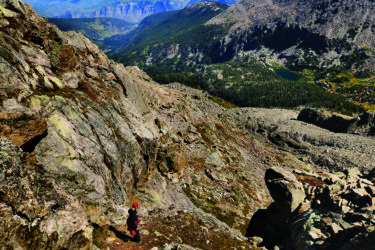The Local newsletter is your free, daily guide to life in Colorado. For locals, by locals.
I’m on a Zoom call with Quinn Brett. This week, the Estes Park resident and advocate for adaptive sports is in Montana’s Glacier National Park. “I work in three different divisions for the National Park Service,” she says, “wilderness, accessibility, and outdoor recreation and conservation.”
Brett is particularly invested in promoting access to the backcountry: Lands situated deep into the wilderness, far away from amenities like roads, bathrooms, and running water. Plains, prairies, deserts, forests. High alpine environments that offer peace and solitude. Places that are often inaccessible to people like her.
In 2017, Brett fell more than 100 feet while climbing Yosemite’s iconic El Capitan. The accident caused a complete spinal injury that left her paralyzed from the waist down. At the time, Brett was a climbing ranger and a record-breaking professional athlete. She worked in technical search and rescue and taught wilderness medical courses. Brett also advocated for the protection of public lands, traveling to Washington, D.C., to meet with members of Congress and encourage them to keep the wild places she loves open to the public.

Her climbing fall changed her life, but today, Brett’s professional pursuits are similar: She still supports protecting public lands, like our national parks, and promotes backcountry accessibility for all—especially for adaptive sports enthusiasts like herself. “The work I do carries over to my personal life of wanting more recreational opportunities besides the pavement on public lands,” says Brett, whose favorite way to hit the dirt in warmer weather is on her offroad handcycle, a three-wheeled cycle that’s built for rugged terrain and propelled by arm, rather than leg, power.
She also enjoys Nordic and downhill skiing, thanks in part to the adaptive sports opportunities offered by many of Colorado’s ski resorts. Trails that accommodate her offroad handcycle, however, are harder to come by. Adaptive riders are often directed to paved, front-country wheelchair paths, but Brett believes Colorado can do better.
“Colorado is building a lot of bike trails. We’re becoming a biking mecca. But most of the trails are not inclusive for adaptive riders,” she says. “Widening a trail by just two inches, or four inches, is not much to ask of a trail builder. It would allow adaptive users to enjoy those biking trails without changing the experience or the quality of the trail for other users.”
Even ADA-compliant and wheelchair-accessible trails sometimes don’t accommodate adaptive equipment like her handcycle, Brett says. For example, she says, “a bridge that’s 24 inches wide [the typical width of a standard wheelchair] is too narrow for my trike. Build the bridge 36 inches wide so I can cross it and get to the other side.”
Brett is currently working with Jefferson County to create more adaptive routes on public lands, but in the meantime, she suggests trails around South Table Mountain and Genesee Park in Golden, Elk Meadow Park in Evergreen, and Bear Creek Lake Park in Lakewood for people looking to get out near Denver on their offroad handcycles.
Brett also invites more organizations to reach out to her and other adaptive sports end users when developing inclusive areas. Too often, she says, public and commercial entities think they’re accommodating people but are falling short of creating truly accessible sites.
“Use me, use all of us as resources,” she says. “We know what we need.”
Get Involved: Adaptive Sports Organizations
High Fives Non-Profit Organization
This group, founded in 2009 by Roy Tuscany after a skiing-related spinal cord injury left him with lower body paralysis, “aims to be the leader of education and recovery of life-altering injuries in outdoor action sports.” The California-based organization provides grants to adaptive sports athletes for equipment and rehabilitation services. It also hosts events nationwide, such as 2022’s High Fives 8th Annual Charity Golf Colorado Tournament, taking place on August 23 in Vail. To make a one-time or monthly donation to the foundation, visit its website.
National Sports Center for the Disabled (NSCD)
In addition to good adaptive ski programs at resorts like Breckenridge, Aspen, and Vail, Colorado is home to the NSCD in Winter Park. The center provides adaptive sports programs in the mountain town and the Denver metro area for skiers, snowboarders, hikers, campers, rock climbers, water sports enthusiasts, and more. The NSCD accepts financial donations through its website and welcomes volunteers, who receive extensive training in their respective sport.
Paradox Sports
Based in Boulder, Paradox is one of the nation’s leading adaptive climbing (ice and rock) organizations, providing indoor and outdoor clinics and trips both locally and nationwide. Their curriculums include climbing clinics, strength training sessions, individualized coaching, and community-building meetups. Visit the Paradox website to sign up for an event, make a donation, or volunteer your time and skills.








